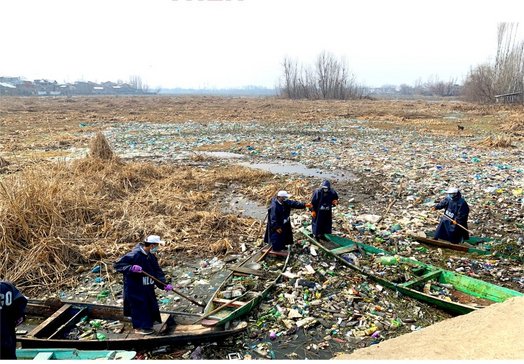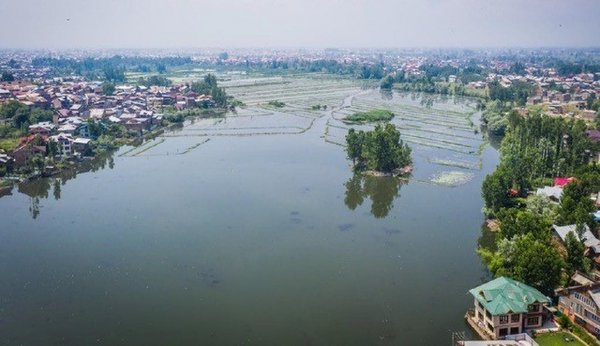- Share this article
- Subscribe to our newsletter
Khushal Sar lake – A success story for ecosystem restoration
Recently, 66-year-old Farzana Begum has been able to enjoy the view from her window for the first time in decades – after years of pollution, the nearby lake has been cleaned and restored. Once a lifeline for the city of Srinagar, providing connectivity and livelihoods to people in the region, Khushal Sar lake had gradually been reduced to a dumping ground for waste. But thanks to a community effort supported by the local administration, the lake has been brought back to life, much to the delight of local residents, farmers, fishers, tourists and environmentalists.
The Himalayan valley of Kashmir in northern India is known for its natural beauty and pristine landscape. Its capital, Srinagar, is popularly known as the city of lakes, with both Dal lake and Khushal Sar located within the city limits. In years gone by, people used the lake as a source of clean water and to grow aquatic plants and catch fish. It also provided a habitat for thousands of migratory birds and was an important navigation route from Dal to the neighbouring districts of Ganderbal, Baramulla and Bandipora. Local elder Mohammad Shafi remembers the tourists who used to flock to the lake in the 1980s to take rides on shikara boats.
Once a tourist attraction, the lake almost disappeared
Over the last 35 years, however, Khushal Sar has all but disappeared from the map owing to a combination of pollution, climate change, encroachment, apathy and a growing population. By 2022, the lake had halved in size since the late eighties, while the city’s population had doubled to 1,660,000.
People living near the lake and its catchment areas have used it as a dumping ground for plastic, polythene and other waste materials – Srinagar produces 500 tonnes of garbage every day, 40 per cent of which is plastic waste. In the last four decades, there have been 18 occasions when the city has had less than 15 mm snowfall, far below the average.

Khushal Sar lake before it was restored. Photo: © Nasir Yousufi
100 days of joint action save the lake
Khushal Sar has now been saved from oblivion by the combined efforts of nature enthusiasts and the local administration. It all started with sexagenarian Manzoor Ahmad Wagnoo, head volunteer of the non-profit Nigeen Lake Conservation Organisation. During an interview on state television about the dilapidated condition of local water bodies, an anchor asked him to suggest measures to restore the city’s lakes to their former glory. After a brief pause, he said simply “ehsas” (“taking responsibility”). The next morning he drove with two of his cousins to Khushal Sar and chalked out a plan for its restoration.
“In devising the restoration plan, we looked at the main factors responsible for the dilapidated condition of the lake,” says Manzoor. “And we decided to start by clearing the lake of solid waste.”
At the beginning of spring 2022, a group of 20 volunteers led by Manzoor spent nearly 100 days manually removing waste from the lake. Manzoor’s team also drew on the services of 10 labourers. In addition to payment, the group provided basic safety gear such as boots, plastic gloves, raincoats and boats.
“It was a huge challenge and we realised that we would have to take a multi-pronged strategy,” Manzoor says. “So we sought the help of the local community and the administration, who chipped in with machinery and expertise.” Srinagar Municipal Corporation ferried 2517 truckloads of solid waste to a dumping site.
Alongside the cleaning efforts, the volunteers worked on the wider issue of encroachment. Initially, there was some resistance to removing encroachments such as metal sheds and fences. But by involving local authorities and arranging for a number of local committees to guard the lake, the volunteers were able to regain a sizeable area of land from encroachers.
“The people living around the lake are key stakeholders. We knew that we would not succeed without their cooperation. So we engaged the community using the slogan ‘ehsas’. We sensitised locals about their collective responsibility for Khushal Sar as part of a mass awareness-raising campaign in and around the catchment areas. We also highlighted the socioeconomic importance of the lake,” explains Manzoor, who was even mentioned in Prime Minister Narendra Modi’s national broadcast ‘Mann Ki Baat’.
Hope for livelihoods
The successful campaign has revived the economic prospects of the local community, who have traditionally earned their livelihood from the lake. Khushal Sar used to be a source for high-quality “nadru” or lotus stem, a popular aquatic plant used as a vegetable in local cuisine in the valley. But as the lake declined, the plant’s production was almost wiped out. “The pollution in the lake made the nadru darker. But following the cleaning efforts, it has become lighter again – and crop yields have also increased,” says Mushtaq Ahmad, a local nadru cultivator.
The joint efforts of the community and the administration have also made the lake navigable again. “The free movement of boats on the lake and the neighbouring water courses will help revive tourism and the local economy,” says Professor Bashir Ahmad, an economics lecturer at the University of Kashmir. Indeed, in recent months, scores of shikaras can once again be seen on the water. The Jammu and Kashmir tourism department have also developed a jetty point. Director of Tourism Faz Lul Hasseb says the department is planning to construct more jetties soon to help continue to promote tourism.
Improved navigation has also given a boost to the fishing community. “For the last three decades, it was impossible to cast a net in the water body because of the muck and mud. But now I can easily use one anywhere on the lake. Of course, there are fewer fish in the lake now, but the numbers will gradually increase thanks to the clean water,” says Mohammad Sultan a local fisherman. Fodder gatherers who collect weed to feed their cattle also benefit from the increased mobility across the lake.
To the delight of environmentalists and birdwatchers, this winter the freshly cleaned waters of Khushal Sar attracted thousands of migratory birds. Locals say it is the first time the birds have visited the water body in around 40 years. Every year Kashmir wetlands host hundreds of thousands of migratory birds who fly great distances from Europe, Siberia and China to spend their winter here. While they forage in nearby paddy fields during the day, the winged visitors take shelter on the lake at night.
A new precedent
With the active support of government agencies, Khushal Sar lake has been restored to its former glory. Inspired by this success, the administration has started to restore other water bodies in the city including Gilsar lake and Vichar Nag. Mohammad Aijaz Asad, Deputy Development Commissioner of Srinagar, says all possible measures are being taken to restore historical water bodies in Srinagar and recreate rich habitats for birds and aquatic life in a belt around the city.
Nasir Yousufi, journalist, India





Add a comment
Be the First to Comment